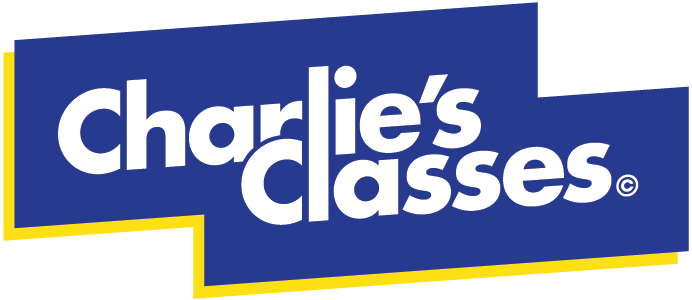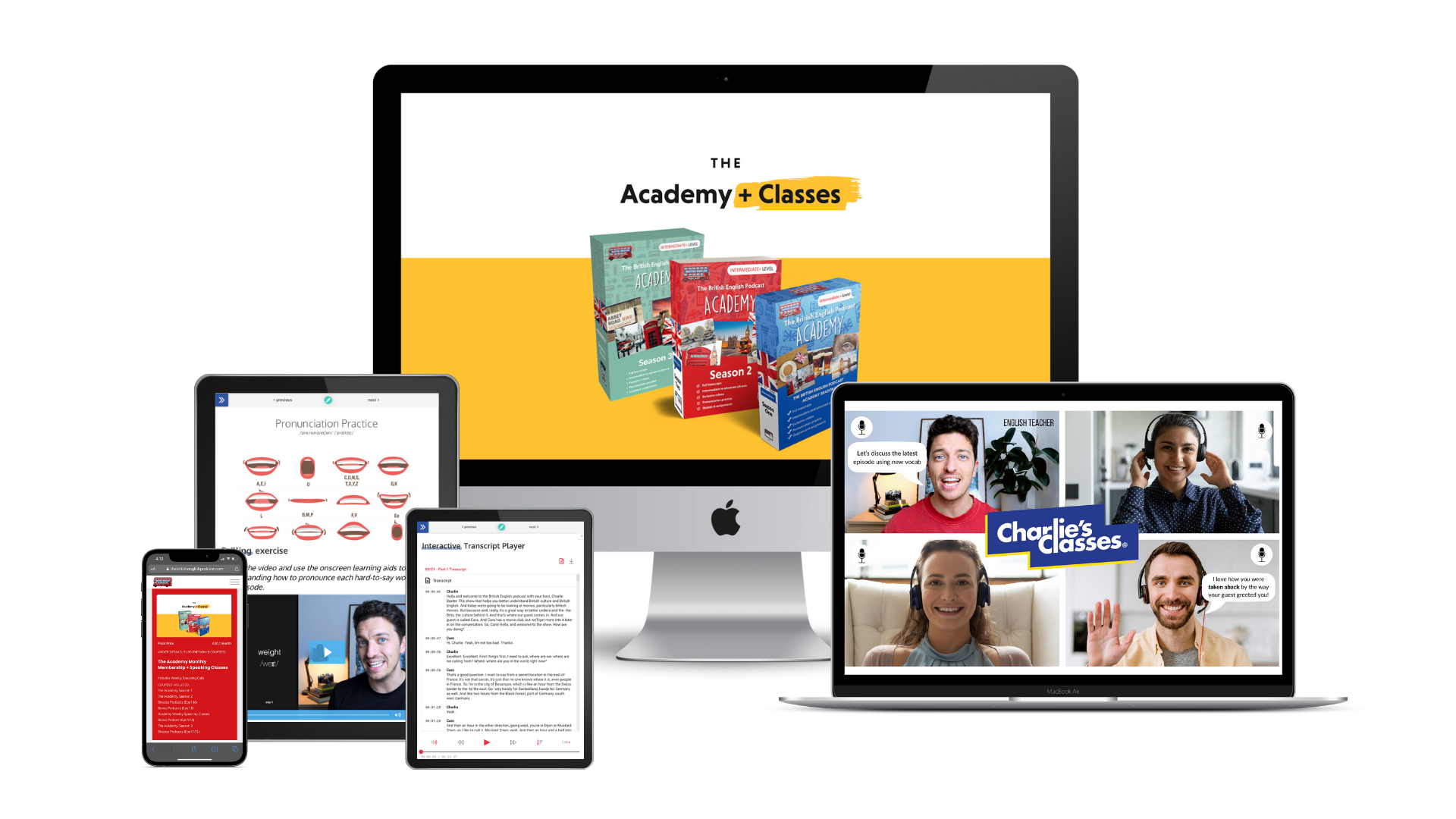Transcript of Bitesize Ep 26 - Transcript
Charlie:
Hello and welcome to the British English podcast with your host, Charlie Baxter. Today we have a bite sized episode and this one is going to be focussing on topic specific vocabulary for talking about food. This is because I run a course called the IELTS Speaking Course on my website, the British English podcast dot com. Now, many of you won't be needing prep for a test, but hear me out. I think the IELTS test, particularly the speaking part, tries to mimic conversational fluency. And because of that, improving your IELTS speaking score is in many ways like improving your speaking skills. And one technique that we've mentioned on this podcast before with Pete from Aussie English is the Vocabulary Islands analogy. The idea that you want to build on these islands of vocabulary, imagine each topic of conversation is an island, and the weaker your vocabulary around that topic, the smaller the island. So we want to grow that island nice and wide, and to do that, we focus on topic specific vocabulary. And as I said, today's episode is focussing on the topic of food, and you will get to hear my response to better understand how to score top marks or certainly very high marks in the IELTS test. And also you'll get exposure to a load of native expressions, and many of them are topic specific to help you build on that vocabulary island. So whether you're interested in the arts exam or not, this episode is going to be very useful indeed. So enjoy listening to a bunch of model answers for part one of the speaking exam, specifically focussing on the topic of food.
Examiner:
Ok, so now we're going to talk about food, and your first question is, what do you usually have for breakfast?
Candidate:
Hmm. Well, on a typical day, I'll just have some cereal. That's all I really need to get going. Maybe a slice of toast with peanut butter if I'm still a bit peckish. And I always have a cup of tea or coffee. I'm not a food buff in any shape or form, but I am particular about my coffee. I always have filter coffee in a cafeteria. Never, never, ever instant. I can't stand that stuff. Obviously, proper coffee takes a bit longer to make. So if I'm in a rush, I'll usually make a cup of tea.
Examiner:
Ok, and at what times do you usually eat?
Candidate:
Well, I have breakfast at 7:00 or soon after 7:00 before I get ready for work. That's pretty routine Monday to Friday, though I'm a bit more flexible at weekends when I'll usually have a lie in and get up any time between eight and half nine, maybe even 10. If if I've been burning the midnight oil the night before, perhaps lunch is at 12 or half 12, depending on what's going on at work and in the evening. I tend to eat pretty early because then that frees up the evening to go out. I don't I don't like to sleep on a heavy stomach, so I try to avoid eating after eight o'clock.
Examiner:
Okay. And do you tend to eat the same things every day?
Candidate:
For lunch and breakfast, yeah, I tend to eat pretty much the same thing. Lunch is always a sandwich with ham and hummus usually or coleslaw with a yoghurt and a couple of pieces of fruit. I packed my lunch myself as it saves a lot of money. Dinners are a bit more varied. It depends on what's in the fridge, really, and who's been shopping and whether we can be bothered to put any effort in. Usually I have meat of some form or other, like sausages or mince or chicken served with some form of pasta or rice or even potatoes. Or if we're going out somewhere, we might have something quick, like an omelette or cheese on toast, right?
Examiner:
And do you think your diet is healthy? And if so, can you explain why or why not?
Candidate:
It's what I consume. Good for me. Yeah, I think it is because I tend not to eat ready meals or too much processed food, and I don't have a lot of sugar in my diet on the whole, and I don't have a lot of fatty food either. I'm not on a strict regime or anything, but I just eat everything in moderation. Occasionally, I splurge out on a big burger, but my day to day diet is pretty good, and I think it's varied. So I'm getting a lot of different vitamins from the fruit and veg that I eat, and I eat plenty of fibre and make sure my my diet is balanced.
Charlie:
Did you know that we have a 45 minute long audio book that also comes with an e-book to read, along with teaching you 10 of the most useful idioms that you can use to sound like a native level speaker? You know the next time that you want to impress someone. Be it for a job interview or an English exam like the IELTS test. Then you can whip out one of these phrases and really wow them. We've selected these 10 because their daily idioms, they're ones that you can use in many, many situations, so you won't be wasting your time learning a random idiom that you'll never really get the chance to use. And the even better news is that we're giving this audio book an e-book away for free, and all you need to do is find it in the show notes of this episode. Head over to the British English podcast Dot Com and find it in the home page. Or just like the free worksheet for this episode. Go to the British English podcast dot com forward slash freebies that is f r e e b i e s.
Examiner:
Ok. And now question five, what is the typical food from your country like?
Candidate:
Well, typical English food. It's often quite stodgy, a bit bland. The popular ones that everyone knows about are fish and chips and roast dinners. And yeah, they're not going out of fashion by any means. Still very popular, though, I don't think people have roast dinners every Sunday like they used to. Pies are quite traditional and they're really popular now. And you can get all sorts of fillings like beef, chicken, game, lots of weird and wonderful things, and big, stodgy puddings like crumbles and spotted dick served with custard are also again popular in our country.
Examiner:
Ok, and can you cook? And if so, what do you enjoy cooking?
Candidate:
Yeah, I can cook. I wouldn't say I like to cook. I don't put much time and effort into it, and I usually stick to pretty straightforward stuff like spag bol, pasta dishes, you know, unless I'm in the mood for doing a roast, that's when I put some effort in and make sure I get the timings right and look up ways to make the roast potatoes all crispy and make sure the meat is cooked all the way through. So, yeah, food isn't something I get wildly excited about. I don't watch cookery programmes or anything functional cooking. That's what I do.
Examiner:
Nice. Ok. And can you describe your perfect meal?
Candidate:
Hmm. Well, if ever I'm going out for a meal, I usually go for a big burger. You know, the biggest one there is with really good quality meat, not the fatty, greasy stuff. And not just beef lamb burgers are probably my favourite, maybe with some mint inside or maybe something a bit more exciting like venison, if they have it and I go the whole hog if they're offering extras and have layers of melted cheese and bacon. Then a few chips and a token bit of salad to pretend I'm eating something healthy.
Examiner:
Hmm. Ok. And do you enjoy eating food from other countries? And if so, which ones? Hmm.
Candidate:
Yeah. Food from other countries. Yeah. I love. I love pizzas. Chinese takeaway, Japanese food noodles and such like as long as it's not too spicy because I don't like that so much. Problem is, there aren't many good international places to eat at around here, and the Chinese restaurants and Indian restaurants are all a bit westernised and don't really serve the real deal. I think you have to go to the cities where they have a bigger migrant population to find the the really good restaurants, and I don't go there too much.
Examiner:
Ok? And which fruits and vegetables do you like and dislike?
Candidate:
Ah Fruit and veg! I like bananas. Yeah, I eat a lot of those. And I like Swedes, peas and potatoes. I pretty much eat everything. I'm not a fussy eater. I like to keep to what's in season if possible, though that doesn't happen all the time. But I can't think of anything that I'm not a big fan of. I suppose there are a few obscure vegetables I don't like. What's that one that tastes like aniseed? Uh, is it fennel? Yeah, I think fennel. That's it. Yeah, that has too strong a flavour for me. But in general, I eat anything.
Examiner:
Yeah. Ok. And is there any food you don't eat?
Candidate:
Food I stay away from is like dairy. I don't like dairy too much, actually. I don't like soft cheese or strong cheeses. You know, the blue veined mouldy stuff. Full fat milk, that's also too much for me. I normally just have skimmed or semi-skimmed. Cream I can manage in small doses. I don't like very fatty foods or greasy foods or very spicy foods, as I said, and things like ginger, which have a strong flavour, or if food is just so processed that it has no natural ingredients whatsoever. Yeah, I don't like that like some of those milkshakes you can get.
Examiner:
Ok. Right. Thank you very much for your answers.
Candidate:
Thank you.
Charlie:
So what you just heard was the bloopers, meaning the mistakes or parts of the recordings that were not good enough for the real thing. So if you thought that was useful for you in regards to improving your IELTS speaking score, then we have created a full course that will interest you as we have even better answers with the target language being visually highlighted as it comes up, then review videos going over the target language in a really thorough and enjoyable way to make your preparation for the IELTS exam fun and enjoyable. We also have a ton of learning resources that go with it, like quizzes, glossaries, flashcards, writing assignments and technique videos and many more things. And to top it all off, there are IELTS classes being held twice a month for every single student who attends this course. So if this sounds like it would help you, then head over to the British English podcast dot com / IELTS and then you can try out the free sample. Learn a ton of information from that free sample and then decide if you want to join in on the fun. That's all from us for today. See you next time.











